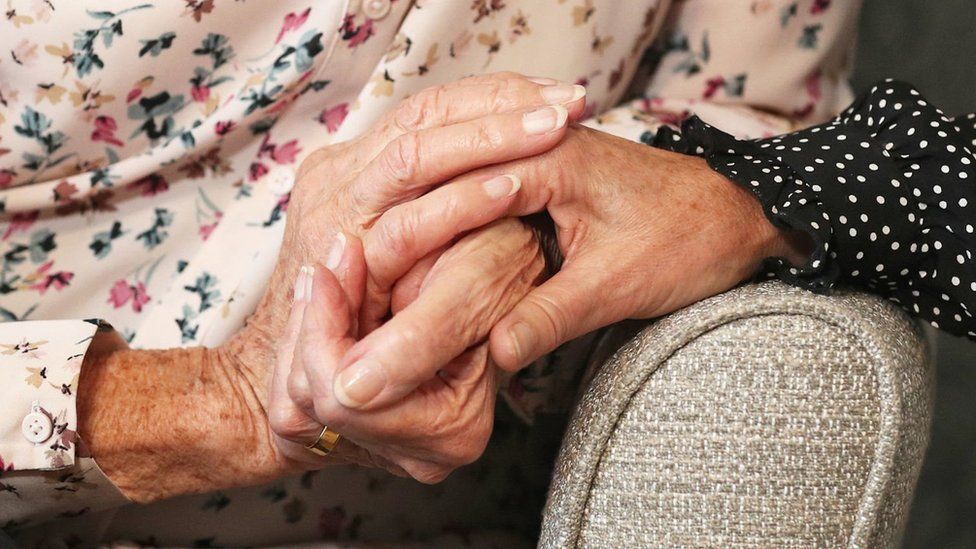Government changes rules on social care cap
- Published
- comments

The financial help poorer people get to cover their care will not count towards a new cap on costs, the government has said.
It was announced in September that from 2023 no one in England would pay more than £86,000 in care fees during their lifetime.
Now it has been confirmed that support payments from local councils will not count towards this personal limit.
Labour said it makes the cap "an even bigger con than we initially thought".
Critics also argue it will make the cap harder to reach than under a previous version suggested by an official commission a decade ago.
But Boris Johnson has defended the government's plan, calling it a "massive improvement" on the current funding situation.
MPs will vote on whether to support the plans next week.
The cap on personal care costs is a central element of the government's plans to change how adult social care in England is funded.
From October 2023, the idea is that no one will pay more than £86,000 over their lifetime for personal care, such as washing, dressing and eating.
Once people have reached this cap, ongoing costs for personal care will be paid for by local authorities.
Money spent on living costs - such as food, energy bills and accommodation - would not count towards the limit.
The threshold for getting some council support to pay for costs will also be made more generous, with people with assets up to £100,000 able to qualify, rather than £23,250 currently.
The government did not specify in September whether people receiving these payments would be able to put them towards reaching the cap.
But on Wednesday, it published guidance confirming that only payments people make out of their own pocket will count.
This contrasts with a previous blueprint for how the cap should work, made by economist Sir Andrew Dilnot in an official report in 2011.
This was put into law in the 2014 Care Act under the Conservative-Lib Dem coalition, but delayed and then eventually ditched under David Cameron.
Under Sir Andrew's recommendations, payments from local authorities would be used to reach the cap.
He argued this was important to ensure poorer people receiving support for a long time did not just end up taking longer to reach the limit, rather than contributing less overall.
'North-South axis'
Giving evidence to MPs on Thursday, Sir Andrew said he was "very disappointed" with the government plans announced on Wednesday.
He told them that it will mean poorer people will only hit the cap "significantly later" and won't end up benefiting as much.
"It will tend to hit people in regions of the country with lower house prices harder than it does those in regions with higher house prices," he added.
"So there is a sort of North-South axis to this, that people living in northern and other less high house price areas are likely to be hit harder by this on average."
Chief executive of the Resolution Foundation, Torsten Bell, also criticised the move, saying the new version of the cap "will now offer little protection to poorer households' assets, while doing much more for those with significant assets - especially in the south of England."
Director of policy at charity The Kings Fund, Sally Warren, also called the change "disappointing".
She said those with low to moderate levels of wealth with be the worst affected, adding: "They may well wonder why the prime minister's promise that no one need to sell their house to pay for care will benefit wealthier people but doesn't seem to apply to them."
'Total disgrace'
Liz Kendall, Labour's shadow social care minister, said it showed "Boris Johnson's so-called cap on care costs is an even bigger con than we initially thought."
"It has now been revealed that the poorest pensioners will have to pay even more," she added.
"This Tory government has failed to be straight with those who've given so much to our country is a total disgrace, but utterly unsurprising. Our elderly people deserve better."
Speaking to reporters on Thursday, Boris Johnson said the government's plans would be a "massive improvement for everybody in the whole country".
"What we're saying is for the first time in history we're stopping people having to pay unlimited quantities for their care," he added.